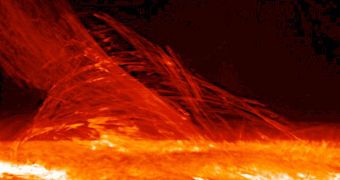Critics who say that global warming is not caused by man have just lost another of their “strong” arguments recently, when a new study has finally determined once and for all that the Sun plays no role in determining the climate change we are currently beginning to experience. The star does not influence ice caps, and does not cause glaciers around the world to melt, the report says. Human activity is the main factor that causes global warming, more specifically the billions of tons of carbon dioxide and other greenhouse gases that we emit in the atmosphere every year. Those who say otherwise have no scientific background for their claims whatsoever.
Some scientists have argued that the changes the Sun is going through at this point may be one of the factors causing global warming. But a team of experts from the Carnegie Mellon University and the Dalhousie University, in Halifax, Canada, has recently developed a new model, which puts the controversial theory to the test. The hypothesis is widely used by oil company lobbyists, and other such individuals, to argue the established scientific fact that global warming is caused by greenhouse gases.
They say that more solar activity produces more solar rays, which, in turn, eliminate more clouds from our atmosphere. As a direct result, more solar rays fall on the surface of the Earth and heat the planet. Strangely enough, their explanations of global warming mention nothing of greenhouse gases, droughts, floods, and so on. Details of the recent model can be found published in the journal Geophysical Research Letters, and mentioned in the May 1st issue of the journal Science.
“Until now, proponents of this hypothesis could assert that the sun may be causing global warming because no one had a computer model to really test the claims. The basic problem with the hypothesis is that solar variations probably change new particle formation rates by less than 30 percent in the atmosphere. Also, these particles are extremely small and need to grow before they can affect clouds. Most do not survive to do so,” Peter Adams explained. He is a Carnegie Mellon Professor of Civil and Environmental Engineering, and also one of the lead developers of the new model, ScienceDaily reports.
“No computer simulation of something as complex as the atmosphere will ever be perfect. Proponents of the cosmic ray hypothesis will probably try to question these results, but the effect is so weak in our model that it is hard for us to see this basic result changing,” Adams added. Some people, indeed, try to force every small detail in solid scientific research, just to be able to say that something else is causing global warming. The interests behind these individuals are not hard to distinguish.

 14 DAY TRIAL //
14 DAY TRIAL //